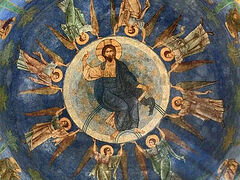You know how when celebrating the Sacrament of Marriage, we sing: “O holy martyrs, who fought the good fight and have received your crowns: Entreat ye the Lord, that He will have mercy on our souls.” That is, the antiphon to the martyrs is sung. Of course, this doesn’t mean that those who get married will suffer martyrdom, but that marriage is also a means of salvation. Man is saved by hard work in marriage, not carnality. It is labor, pain, the effort to accept another person into yourself, to kill your “I,” to give another what they need that is salvific in marriage. This is no small work, and it requires much effort.
The number of unsuccessful marriages is constantly and steadily growing today. This largely arises from the fact that people don’t understand that there can be no carnality in marriage, but only hard work. One half asks for something from the other. The husband asks what he wants from his wife, and the wife, in turn, asks what she wants from her other half. So disputes arise between them. But the husband doesn’t sit down with his wife to discuss, to think, and to understand: And what should I give my wife? To realize the reason for these fights and ask himself: “What should I give this person? I’m the husband, and what should I give my wife?”
Or:
“I’m the wife, and what should I give my husband?”
He comes to me and says:
“I’m a respectable person. The whole day, from morning till evening, I work. I return home tired, and my wife has found a lover!”
And she says:
“I sit home all day, and he doesn’t smile at me, doesn’t talk to me… He doesn’t pay any attention to me. I’m tired of him. I’ve had enough of him and I don’t want to live with him!”
And what happens happens. Something tragic happens—something I don’t even want to talk about. All of this happens because of us, because we’ve lost the feeling of healthy love, of love that is self-sacrificing, and of kenosis towards another person—that is, the rejection of our self-gratification and the acceptance of another has disappeared, and in marriage all this begins to work differently. When a man can’t give what his wife wants, then he becomes superfluous to her, their relationship becomes frustrated, and then tragedies occur—which I think it’s better for you not to know about. It’s terrible to see a mother pushing her own children away and placing her own pleasures, satisfactions, and peace of mind first. Do you know how terrible this is?!
And you tell the mother:
“Listen, don’t get divorced, because your children will have problems. They need their parents—both of them! Accept your husband as he is, even if he doesn’t say anything nice to you, even if he doesn’t pay any attention to you. Be patient. Endure your other half!”
“No, I can’t do that!”
“Do it for your children!”
“No, I can’t! I don’t love him!”
“Do you have to love him, my child? Show him some patience!”
Spend time with him more often, whether he’s a tiger or a lion; spend every day with him, even if he’s a snake, and you’ll love him. There are people who daily fed milk to a snake, and then they became best friends with it. So is this other person so scary? After all, he’s a man. When you see a parent whose nature teaches him to sacrifice for the sake of his children, but he rejects this relationship with his child, he rejects the sacrifice, then we understand well what ground we’re treading on. But in the olden days, people had enough patience, and they tolerated their spouses. They endured a lot—mainly women, who, although their nature has no manliness, they have patience and endurance. The stronger half of humanity has manliness, but no endurance. But a woman has no manliness and for example, if someone comes into her house, she’ll call the police, because she doesn’t have the manliness to drive out an uninvited guest. But she has great endurance. Check it out, especially concerning girls, and you’ll understand it all yourself. This is the nature of a woman. This is how the Lord created her, because she’s a mother. If a mother didn’t have patience, she would strangle her children! How many nights does a child cry? The child will cry and cry, and then one night, the mother does something to stop the crying once and for all. However, she has enough strength to raise her children—not one, two, three, but in the past they had ten, and even twenty children. And the mother endured when her child wept all night, crying, and screaming; she doesn’t know what her child wants, but she patiently endures it all.
Our nature teaches us. I remember the words of one holy man, who said:
“Nature testifies to God.”
But sin distorts nature. In a perverted nature, diligence is replaced with carnality, selflessness with self-love, simplicity with cunning, love with gratification. That’s how it goes—everything behaves the opposite way. We have to reject what is contrary to our nature. Sin is something beyond nature, something that distorts nature, and in this is a difficulty that we must be very well aware of. I’ve already spoken about this. Christ’s Beatitudes end with the promise that we’ll be persecuted, that we’ll be slandered, that we’ll be harassed, that they’ll lie about us; but all this will happen in the name of Christ, and in all this we should only rejoice. But worldly thinking is the opposite: People say nice things to us:
“What a good person you are! How capable you are! What a successful person you are! How good natured you are!”
And we rejoice in this. We’re praised, and we like it. Such is our nature. And when people say bad things to us, we’re sad, we get upset, we react violently, indignantly, and we’re outraged.
However, we must gather strength to enter into this space and see what our boundaries are.
One day, several young people came to our monastery at 3:30 in the morning and knocked at the gate. We were in church. One of the monks went to open up and found several young people standing before him, smelling of wine.
“Where did you come from, my children?”
“From a distant city in Cyprus!”
I asked one of them:
“Where have you been?”
They answered my question with a question:
“Where have I been, Father?”
“Yes, where have you been?”
“In hell!”
I told him:
“You smell like wine!”
Then I told him that this is a great privilege; when a man reaches his very limits, then comes either death or the Lord. But when a man is on his own, he either becomes a god, or a demon, a beast. When a man sorrows, he either becomes a saint or he resists it and spiritually destroys himself. Our era is characterized by the so-called marginal space in which we live and in which many young people live. Of course, this marginal space is dangerous—don’t enter it, it’s like a minefield. But if we enter into it—and I think that at some point, everyone enters this space—we won’t survive there for long. However, in this space, in this outer limit, this marginal state, man has an opportunity—and it’s a great privilege: You can call upon God and take Him by the hand. When you’re in despair and there’s no one to support you, when you’re inconsolable, when you have no hope, when everything is all black, when all hope has completely faded, then comes the only and true Hope. Therefore, we call the Most Holy Theotokos the hope of the hopeless.
This is something great, this is a great moment, when a man is in this state, when you’re on your own, when you’re truly alone, when there’s no one with you and everyone has abandoned you. And did you know that this urban loneliness is worse than mountain loneliness? In the mountains you’re not on your own; there you can talk to a tree, you can talk to rocks. And who is there to talk with in the city, and what can you talk about? With a traffic light? And what will you talk about with it? You can’t really talk with anyone at all; everything’s dead. Look how people talk on the phone. They sit on the couch and talk on the phone. But this is imaginary communication; that is, it’s communication through a cable; impersonal communication. The person’s face is ignored here. A man talks on the phone, he laughs, kisses, and strokes it; it’s good that he doesn’t eat it; he expresses his delight to it, his tension, and if he’s nervous, he might even hit it.
One time I went to a house and saw a broken phone.
“Can I make a call from your phone?”
“Of course!”
I went to the table where the phone was. The receiver was broken too.
I asked the owner of the house:
“What happened? Who broke your phone?”
“No worries, Father! Our daughter did it! She was talking with her boyfriend the other day, and sometimes her emotions just run wild, and she threw the phone on the floor.”
In these extreme situations of isolation, in moments of despair and depression, which are common today, when you feel suppressed, in these moments, you have only one opportunity left—a very great, very, very great opportunity—the opportunity to talk with God. These are the moments when the Lord can talk with you. Why do you think the saints aspired to these extreme situations? For example, hermit monks went to live alone and willingly deprived themselves of every human comfort, not accepting any human consolation, and didn’t even look at people.
In the Patericon we read: “Father, where should we take you?” “Where there are no people.”
Or in other words, where my eyes won’t see anyone. Why? It’s not that people can do some kind of harm, but because that’s what human nature is like. When a man is comforted by what surrounds him, he’s distracted by it; that is, his work, his knowledge, his car, his wife, his children, his health—all this is good…





